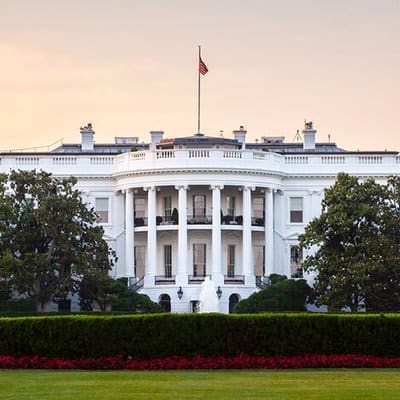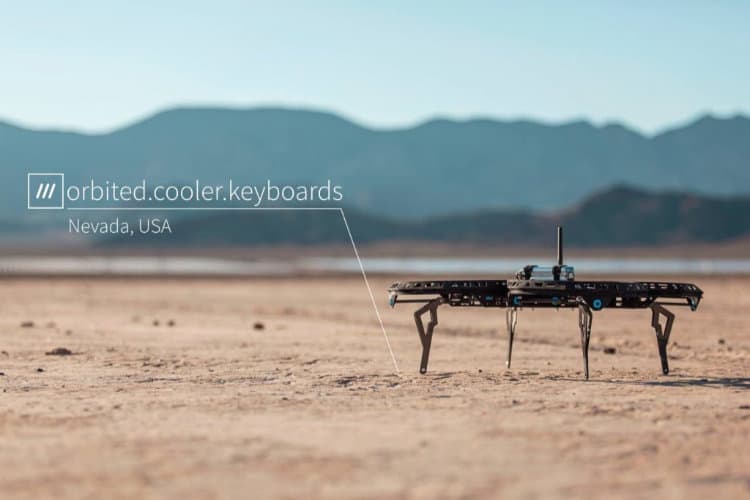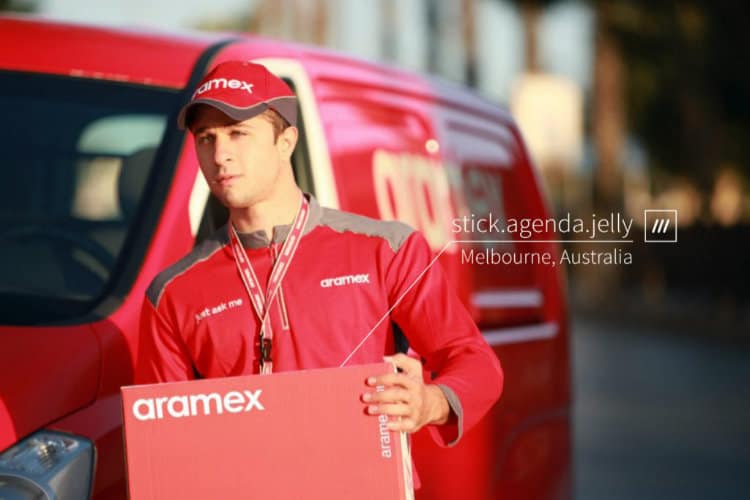What3Words, New Kind of Street Address?
Coming out of the curiosity bucket this week, we came across a service that is changing how to address shipments. What3Words uses three English words to construct a detailed location for delivery services.
You may have the same reaction we did, what is wrong with regular street addresses? Is 1600 Pennsylvania Ave NW, Washington, DC 20006 really that hard?
We think USPS, UPS, FedEx, and just about every other delivery service in Washington DC is going to find that street address. It’s the White House!
The company mapped the globe into about 57 trillion 3 meters by 3 meters squares, creating unique addresses for each square with English (or one of the other 13 supported languages) dictionary words. What3Words uses a scheme that combines the three words with periods (i.e., word1.word2.word3)
 Since the White House is a bit larger than 3 meters by 3 meters, when using the app you can move around the White House grounds and get a selection of unique What3Words addresses.
Since the White House is a bit larger than 3 meters by 3 meters, when using the app you can move around the White House grounds and get a selection of unique What3Words addresses.
The Oval Office should be able to receive packages by sending them to rich.soup.noble.
Deliveries to the White House Press Room could be addressed to refers.blows.logic.
Last minute document shipments to the Cabinet need think.rewarding.vague on the address line.
If your kids want to send a letter to Santa, USPS will be happy to receive them at wiped.wobbling.trinkets. The main post office in North Pole, AK. USPS runs a service out of that office that postmarks From Santa letters.
Of course, most deliveries are not going to exact locations within a building, especially one as tightly controlled as the White House. So, for now, you still have to use that old standard 1600 Pennsylvania Ave NW, Washington, DC 20006 address.
DEVELOPING AND EMERGING MARKETS BENEFIT MOST FROM WHAT3WORDS ADDRESSES
However, in developing and emerging markets, this type of geographic coordinates system could be very beneficial.
Outside of developed urban areas, addressing gets a bit tricky. Try sending a package into the middle of Namibia (the author actually did this using DHL), and the addresses may only include the town and postal code with the name of the recipient and a phone number.
In such cases, courier companies have to call the recipient for exact directions or arrange meeting points at gas stations or other easily found locations.
The company claims over 75 percent of countries lack a reliable address system.
“Indonesia is the fourth most populous country in the world, but it has no semblance of an address system,” Chris Sheldrick, Founder and CEO said in a BBC article about the company.
The app is free to download for Android and IOS. With the app, anyone can find their unique geographic What3Words address and provide it to the service or retailer that uses the system.
What3Words seems to have some actual real world commerce uses. Dubai based Aramex logistics company (serving select countries in the Middle East, Africa, Southeast Asia, Australia, North America, and Europe) integrated the 3-word addressing system.
And local retailers such as Domino’s Pizza in Sint Maarten and Monos, Ulaanbaatar’s (Mongolia) largest pharmacy chain also use the 3-word solution.

POSTAL ACCEPTANCE ESSENTIAL TO WIDESPREAD ECOMMERCE USE
Of course, the whole idea only works well for eCommerce if there is widespread postal acceptance. Right now there are only seven countries that have integrated What3Words addresses into their postal systems.
- Nigeria
- Solomon Islands
- Djibouti
- Tonga
- Sint Maarten
- Côte d’Ivoire
- Mongolia
Critics of the What3Words addressing system point to a proprietary scheme entirely owned and controlled by a private company.
Other issues arise with multi-floor situations. In standard street addresses, suite or apartment numbers are common, but there is no internal function for this in What3Words.
Presumably, you could send shipments to Goldman Sachs & Co. in Miami (200 Biscayne Blvd, Suite 3700, Miami, FL 33131) as exposes.goats.spring Suite 3700.
DRONE DELIVERY ANOTHER POSSIBLE USE
Drone deliveries could also benefit from this system. It is unlikely that a homeowner wants their delivery to take place on the front lawn. So with What3Words addresses, a buyer can specify the exact drop location for a package.
Again, there are multi-floor challenges. But courier companies may look at drone deliveries for single family homes or remote areas while servicing multi-floor dwellings with human couriers.

GLOBAL ECOMMERCE ACCEPTANCE REQUIRES A MAJOR PLAYER
To date, no publically known integration tests exist by a major player in eCommerce parcel delivery such as Amazon, UPS, FedEx, or DHL. The largest delivery company to adopt the 3 word address scheme is Aramax who mostly serve the Middle East and Southeast Asia.
While Aramex delivers globally, the company by itself is too small to push for widespread acceptance of the What3Words addressing system.

Deutsche Bahn, the second largest transport company in the world, provided funding to What3Words. The logistics company is looking for opportunities to deploy What3Words services in its operations.
Here again, Deutsche Bahn is not a parcel delivery company. So that won’t change the dynamic in the widespread acceptance of What3Words for parcel delivery.
But the company is on the radar screen with parcel and delivery services. As more eCommerce logistics players watch the business or start using the addressing system, there is a chance we will see widespread adoption.
“Absolutely love the idea of what3words. Anything that shakes up the norm,” said James Hayes, Co-Founder Parcel Station, a UK based global packet and parcel shipping company for online retailers. “Why not have a simplified address system for those places that can use it. I will follow with great interest how that progresses.”
If you are equally intrigued, and want to see how the system works, What3Words provides integration information for the following eCommerce platforms:
- Magento
- WooCommerce
- BigCommerce
- Shopify
Shopping cart integration appears to use the standard street address along with the 3-word address provided by the What3Words system.
And if you happen to have an order going to one of the seven countries that use the system as part of their postal system, then why not add the information (if provided by the customer).
EMERGENCY AND AID SERVICES BIGGEST BENEFACTORS TODAY
The jury is still out if What3Words can become an addressing system of the future for eCommerce. But many other uses have a humanitarian and lifesaving impact today.
Aid Agencies or Emergency Response agencies and groups can easily benefit from this technology. There is already a United Nations app used by drivers and security teams to find assets, people and report incidents.
To an extent, aid and catastrophe response are a natural fit for this technology.
THE FUTURE OF ADDRESSING MAY NEED A COMPLETE RETHINK
As we stated in the beginning, “What is wrong with regular street addresses?” That is us looking from a developed world view, where street addresses are pretty good in describing delivery locations for couriers and postal carriers.
However, when looking at the future of eCommerce, What3Words is addressing a problem most eCommerce sellers may not realize exists.
Remember our Shopify article about where they are experiencing the largest growth in eCommerce sites? Emerging markets are an expanding segment for Shopify and other eCommerce platforms and SaaS services.
With the rise in the emerging markets and communication infrastructure improving, eCommerce sellers may see an increase in orders from places you never heard of before. Even Google Maps may have a problem with addresses in remote areas 🙂
If your customer doesn’t have a real street address or has a vague address, you may need an alternative addressing method to get the package delivered to them.
Therefore, What3Words might be that solution to that problem. And it is worth keeping an eye on this company or other innovators that assist the 75 percent of countries that have poor street address systems.
We love to hear your thoughts about alternate addressing for eCommerce. Especially, if you had problems with deliveries in emerging markets. Please use the comments section below to give us your thoughts.
If you liked this article and would like to engage with other small business entrepreneurs selling on marketplaces, join our [the_ad id=”41560″ inline =”1″]. You can also find us on [the_ad id=”41579″ inline =”1″], [the_ad id=”41573″ inline =”1″], [the_ad id=”41575″ inline =”1″], and [the_ad id=”41577″ inline =”1″] or sign up for our newsletter below.
SIGN UP. BE INSPIRED. GROW YOUR BUSINESS.
We do not sell your information. You can unsubscribe at any time.
Richard Meldner
Richard is co-founder of eSeller365. He has over 17 years of experience on eBay which includes tens of thousands of sales to buyers in over 100 countries and even has experience with eBay’s VeRO program enforcing intellectual property rights for a former employer. And for about two years Richard sold products on Amazon using Amazon FBA in the US.
To “relax” from the daily business grind, for a few weekends a year, he also works for IMSA as a professional race official.


I’ve read several good stuff here. Definitely worth bookmarking for revisiting. I wonder how much effort you put to make such a great informative website.
We try our best. Thank you for your comments.
I live in New Jersey. Thanks to the local addressing system, I can’t tell you how often Fedex or UPS has failed to deliver because they claim they can’t find me. I’d like to see them accept W3W addresses.